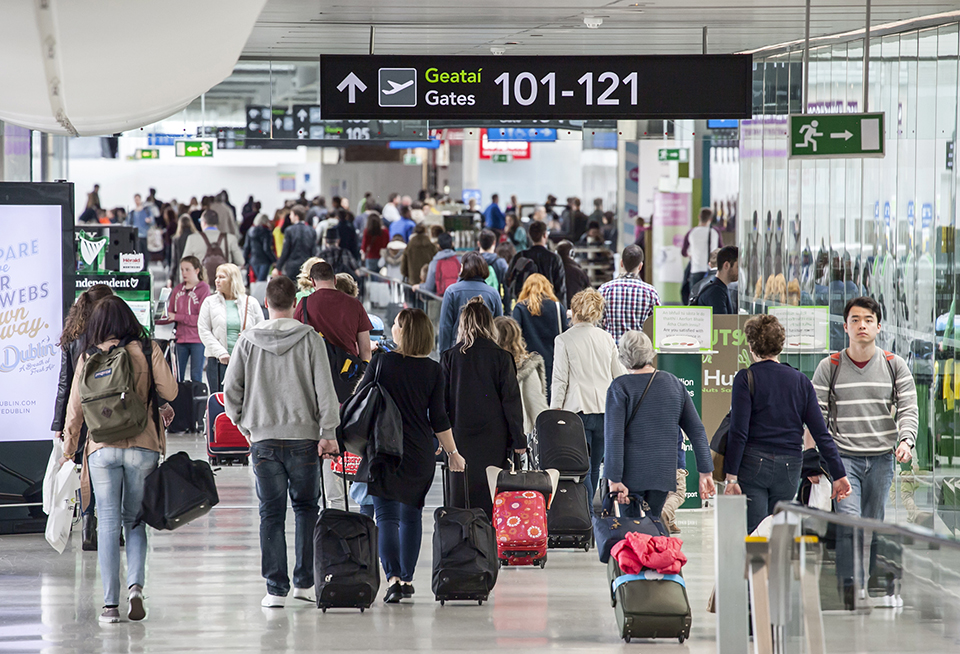
• EBITDA €289m +7%
• Profit after tax €133m +6%
• Dividend €40m +7%
Profits at daa Group increased by 6% to a record €133 million last year as the company, which has operations in 13 countries, benefitted from higher passenger numbers and increased commercial income.
daa’s results for 2018 showed that the Group, which operates Dublin and Cork airports, the global travel retailer ARI and daa International, had another positive year.
Total passenger numbers for Dublin and Cork airports increased by 6% to a record 33.9 million last year. Dublin Airport had its eighth consecutive year of passenger growth, while Cork Airport saw its third successive year of increased traffic.
Domestic turnover grew faster than the overseas business, which comprises ARI’s global travel retail operation, investments in airports in Cyprus and Germany and daa’s overseas airport management and advisory subsidiary.
“daa had a good year in 2018, with our key financial and passenger metrics improving,” said Chief Executive Dalton Philips. “Dublin Airport welcomed a record number of passengers, Cork’s traffic further improved, and we made significant progress on our plans to deliver North Runway and the other vital infrastructure that is required at Dublin Airport. The Group also continued to expand connectivity at the State’s two largest airports, which is essential to allow the Irish economy to grow in a post-Brexit world.”
Turnover increased by 5% to €897 million, with good growth in commercial activities, aeronautical income, and increased sales at the Group’s international businesses. Earnings before interest, taxation, depreciation and amortisation (EBITDA) increased by 7% to €289 million for the year.
Operating costs increased by 4% to €426 million, as daa recruited almost 190 additional staff at its Irish airports and its overseas businesses.
Net debt was further reduced during the year, declining by 18% (€100 million) to €441 million. daa is to pay a dividend of €40 million to the State for 2018, which brings its total dividend payments to €125 million over the past four years.
Passenger numbers at Dublin Airport increased by 6% to a record 31.5 million last year, as the airport facilitated an additional 1.9 million passengers. Dublin Airport welcomed 16 new services and six new airlines in 2018 and there was additional capacity on 22 existing services.
Connecting passenger numbers increased by 18% to 2.1 million, as Dublin Airport continued to expand its role as a major gateway between Europe and North America. Some 29.4 million passengers started or ended their journey at Dublin last year.
Passenger numbers at Cork Airport increased by almost 4% to 2.4 million last year. Cork, which is the State’s second largest-airport, has increased its passenger traffic by 16% over the past three years. Three new routes were introduced at Cork last year, and there were capacity expansions on 14 existing services.
Both airports have a strong pipeline of new and expanded services for this year and have made a positive start to 2019. Passenger numbers at Dublin Airport have increased by 7% so far this year while Cork’s passenger numbers are up by 11%.
Dublin Airport will have 23 new routes this summer, including new long-haul services to Canada, China and the United States. Cork Airport has seven new routes this year and extra capacity on eight existing services.
The new routes at its Irish airports should underpin continued passenger growth this year, however Mr Philips said the Group remained cautious, as there were potential challenges ahead.
These include resolving runway planning conditions and delivering the new facilities needed to meet increasing demand, which would enable Dublin Airport to grow its capacity to 40 million passengers per year. In this context, it is essential that the Commission for Aviation Regulation, which sets airport charges at Dublin Airport, enables the investment programme that is urgently required. “Our airline customers and our passengers want us to invest in new facilities at Dublin and they are required by the Irish economy,” Mr Philips said. There are also downside risks in the global aviation sector, he added.
While construction of North Runway continues, daa will continue to seek the amendment of two onerous conditions that will apply once the new runway is built. The conditions mean Dublin Airport would have significantly fewer flights between 11pm and 7am with two main runways than it currently has with one.
Up to three million existing passenger journeys would be lost as soon as the conditions are applied, Mr Philips said. “Dublin Airport’s capacity would be almost halved during its busiest time of the day, which is between 6am and 7am. It has never been our intention to have lots more flights in the middle of the night, but these conditions would decimate the airport’s busiest times of the day and have a hugely negative affect on the entire Irish economy for decades to come.”
The appointment of Fingal County Council as the new independent noise regulator for Dublin Airport is currently going through the Oireachtas and the new regulator will ultimately decide on the issue. “There is a balance to be struck between Ireland’s national economic needs, particularly in the context a more uncertain world post-Brexit and mitigating the impact of the runway development on local communities,” Mr Philips added.
The international arm of daa’s travel retail business ARI made after tax profits of €13 million during the year. ARI operates stores in North America, Europe, the Middle East and Asia-Pacific, and also holds daa’s 20% stake in Düsseldorf Airport and the Group’s 11% stake in Hermes Airports in Cyprus.
Profits at ARI declined due to higher concession fees after recent contract renewals and the impact of a restructuring programme at its Cypriot airports. ARI signed agreements to enter new markets in Indonesia and Saudi Arabia in 2018 and will operate stores at Abu Dhabi’s new Midfield Terminal when it opens in late 2019.
Passenger numbers at Düsseldorf Airport declined by 1% to 24.3 million last year due mainly to the fallout of the 2017 collapse of Air Berlin but have returned to growth this year. Traffic at Hermes Airports, which operates Larnaca and Paphos airports, increased by 7% to 10.9 million.
Terminal 5 (T5) at King Khalid International in Riyadh, Saudi Arabia, which is operated by daa International had a year of strong passenger growth. Traffic increased by 13% to 14.7 million in T5, which handles domestic flights. daa International also recently signed an agreement to advise on the operation and development of two regional airports in the Philippines.
